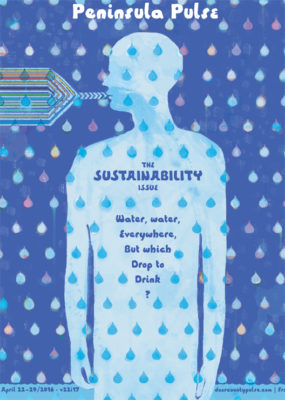When It Comes to Water, the Activists Have Saved Us
- Share
- Tweet
- Pin
- Share

Activist.
It’s an adjective used most often as an insult today, whether it be directed at those occupying Wall Street, marching against police shootings, or even used against the so-called “activist judges” of the Supreme Court.
For decades it has been used against environmentalists, and not just those rallying against climate change. But it was activists who unearthed the devastating impacts of DDT, the harm to people and wildlife that came from the use of heavy metals on golf courses, and the way phosphorus runoff was decimating fisheries and aquatic habitat.
In this issue you’ll learn how that activism continues to trickle down to impact our environment here on the Door Peninsula.
Activism led to dramatic improvements in how our orchards grow fruit, and golf courses manicure their grounds, which you’ll find in this, our 10th annual Sustainability Issue.
Jim Lundstrom shows you how Sturgeon Bay Utilities is removing lead pipes from its system, and Jackson Parr takes a look at why some communities adopt municipal water and others don’t, and what that means for those doing business there.
Lundstrom also unearthed a 2003 call to action on water management that fell on deaf ears in Madison, reminding us that persistence is crucial in convincing the state to take action, no matter how fruitless it can seem.
 In talking to experts about golf courses, I found that an even greater concern are the millions of us around the country who dump fertilizers and pesticides on our small home lawns, much of it unnecessarily. Fortunately, I also found a few citizens and organizations finding ways to nurture their landscapes with a lighter touch and pushing others to do the same.
In talking to experts about golf courses, I found that an even greater concern are the millions of us around the country who dump fertilizers and pesticides on our small home lawns, much of it unnecessarily. Fortunately, I also found a few citizens and organizations finding ways to nurture their landscapes with a lighter touch and pushing others to do the same.
When it comes to environmental policy, Jay Feldman, founder of Beyond Pesticides, says that change starts at the local level. On the Door Peninsula, we see that in those fighting for clean water in Kewaunee County, in Patrick Fitzgerald speaking out for Safe Lawns, in Alyssa Skiba’s look at the Healthy Water Door County effort, and Jim Lundstrom’s profile of local teacher turned clean water activist Dean Hoegger.
In last year’s Sustainability Issue we looked at the impact large farming operations are having on Door County land, primarily in the southern half of Door County and in Kewaunee County. This year we turned our eyes toward the inputs and water treatment infrastructure in Northern Door.
Why did we point our focus to groundwater issues again this year? Well, we simply found that we had more questions, especially in light of the lead contamination in Flint, Mich.
The first time I remember giving a second thought to the quality of Door County’s drinking water was when I was 14. Local television, print and even state newspapers buzzed with word that wells in Ephraim were contaminated with coliform bacteria. Though I lived in Egg Harbor, everyone with a stake in the tourist trade worried that it would affect business.
The problem was largely relegated to wells on the village’s northern end and was short-lived, and though nobody ever fell ill from the contamination, the shady impression of Ephraim water lingered for years.
That relatively minor incident just goes to show how important it is that Door County residents and those who care about the peninsula be vigilant about its water supply.
Our goal is that you put this paper down after you’ve read it and find yourself not only informed, but armed with the motivation and resources to engage in these issues yourself, whether it’s joining those who speak out on behalf of our natural resources, or simply making a few smarter day-to-day decisions.
Or even, if you’re so inclined, to embrace the label of activist.

